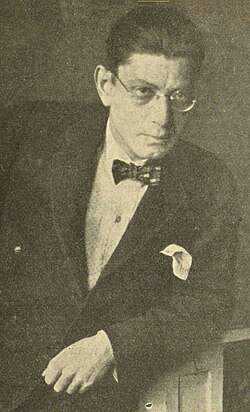Dr. Arthur Ernst Rutra (geb. Samuely)

Personalia
Born:
Died:
Profession:
KZ Number:
Curriculum Vitae
Arthur Ernst Samuely was born in Drohobych near Lviv in Galicia [today: Drohobych near Lviv in Ukraine] into a Jewish family as the legitimate son of the merchant Sigmund Samuely and Rosa, née Halpern. In 1903, he came to Vienna with his mother, who came from a Jewish family of scholars (his parents had divorced), where he graduated from the Mariahilfer Gymnasium. From 1911 to 1913 he studied law at the University of Vienna, and from 1913 German and Slavic studies. In 1915 he volunteers for the I. World War I. In the same year, Kamönenverlag published his poem Russensturm. An episode from the battles in the Carpathians. In 1917, while serving in the regiment, he earned his doctorate with a dissertation on Ludwig Börne.
From 1918 to 1933, Arthur Ernst Samuely lived in Munich as a publicist, playwright and publishing editor. Presumably at this time, he used the name 'Rutra' - the anagram of 'Artur' - as a pseudonym for his surname. From 1920, he was a member of the board of the Schutzverband Deutscher Schriftsteller and a member of the Verband Deutscher Bühnenschriftsteller. Arthur Ernst Rutra had greater success with his plays, in particular with the tragedy The Crown Prince from 1928. Max Reinhardt acquired the play for the Deutsches Theater in Berlin, followed by performances in Hamburg, Nuremberg, Frankfurt, Bochum, Duisburg and in Vienna at the Burgtheater.
After the National Socialists seized power in Germany in 1933, Arthur Ernst Rutra returned to Vienna, where he joined the Vaterländische Front in 1935. He became a contributor to the magazine Der Christliche Ständestaat and converted to Catholicism in 1937. He and his mother now also change their surname to 'Rutra' in a civil ceremony.
On March 12, 1938, he witnesses the demise of the free and independent Austria he had so passionately campaigned for with the invasion of the German Wehrmacht. With the occupation of Austria, German legislation was adopted and with it the 'Nuremberg Race Laws', according to which Arthur Ernst Rutra was considered a 'full Jew'.
His involvement in the debate on German and National Socialist press attacks against Austria's independence and, above all, his collaboration with Hitler's intimate enemy Otto Strasser were probably the reason why he was arrested by the Gestapo on the very day of Austria's occupation. On April 2, 1938, Arthur Ernst Rutra was deported to the Dachau concentration camp on the so-called 'Prominent Transport'. Between May 21, 1938 and October 9, 1939, he was sent to a place that can no longer be determined, from where he was transferred to the Buchenwald concentration camp on October 9, 1939. On October 21, 1939, he was transferred from the concentration camp to a prison in Berlin, as he was to be tried for 'preparation for high treason'.
In a trial before the People's Court on April 2, 1941, Arthur Ernst Rutra was sentenced to 15 years in prison. In the summer of 1942, he was transferred from Berlin to the Sperlgasse collection camp in Vienna, from where he was deported to the
Rutra was deported to the Dachau concentration camp and later to Buchenwald with other representatives of the corporative state at the beginning of April 1938. In 1941, the People's Court sentenced him to 15 years in prison in a treason trial. On October 5, 1942, he was deported with 548 other people declared as "Jews" from the Vienna Aspang train station to Maly Trostinez near Minsk, where he was murdered on October 9, 1942, according to the Central Database of Shoa Victims' Names (Yad Vashem).
Places
Residence:
Persecution:
Death Place:
Citations
Dokumentationsarchiv des österreichischen Widerstands (DÖW)
UeLEX unter uelex.de/uebersetzer/rutra-arthur-ernst/
Österreichisches biographisches Lexikon unter www.biographien.ac.at/oebl/oebl_R/Rutra_Arthur-Ernst_1892_1942.xml
Wikipedia unter de.wikipedia.org/wiki/Arthur_Ernst_Rutra
Stadtportal München unter gedenkbuch.muenchen.de
Blaeulich, Max (2015): Arthur Ernst Rutra (1892-1942). In: Literatur und Kritik (Salzburg), Heft 491/492, März 2015, S. 93-110.
